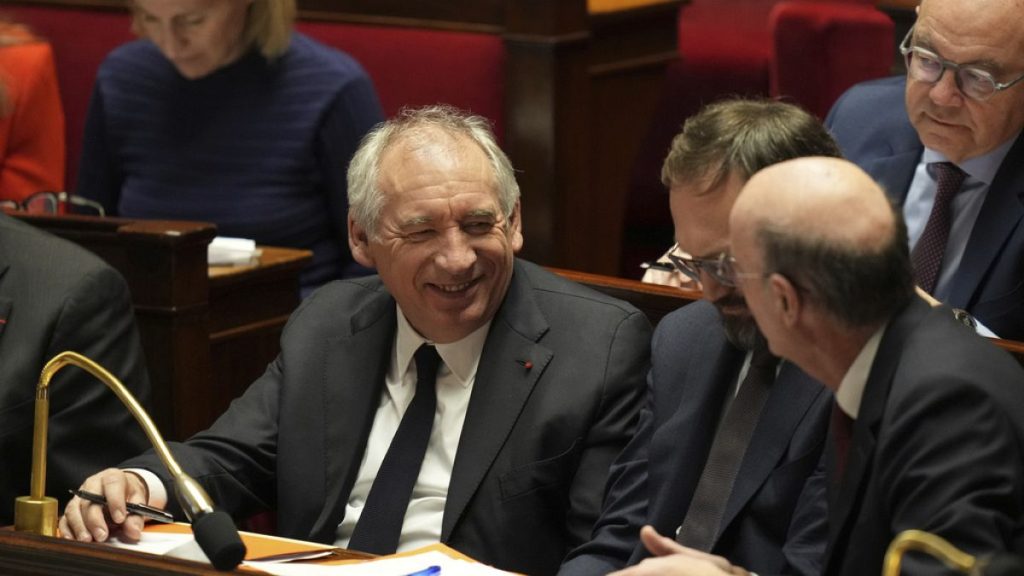The French political landscape witnessed a dramatic turn of events as Prime Minister François Bayrou narrowly survived a no-confidence vote, revealing deep fractures within the left-wing coalition and highlighting the precarious nature of governance in the face of economic challenges. Bayrou’s survival hinged on the unexpected decision of the Socialist Party to abstain from the vote, a move that defied their left-wing allies and sparked accusations of betrayal. This surprising development underscores the complex political calculus at play as parties grapple with competing priorities and the pressure to maintain stability amidst a backdrop of economic uncertainty.
The no-confidence motion, initiated by the hard-left France Unbowed (LFI) party, was a direct response to Bayrou’s general policy speech, which outlined a roadmap for the new government. Key proposals included renegotiating President Macron’s controversial pension reform, a move aimed at appeasing public discontent, and implementing significant budget cuts to address the burgeoning national deficit. Bayrou also strategically pledged to protect jobs in the public education sector, a move widely interpreted as an attempt to sway the Socialist Party away from supporting the no-confidence motion. This tactical maneuver proved successful, highlighting the delicate balance of power within the National Assembly and the influence of targeted concessions in shaping political outcomes.
The Socialist Party’s decision to abstain from the vote, while ensuring Bayrou’s survival, ignited a firestorm of criticism from their partners within the New Popular Front (NFP) coalition. Jean-Luc Mélénchon, the prominent leader of LFI, publicly condemned the Socialists, accusing them of fracturing the NFP and undermining the collective power of the left. This internal rift exposes the inherent tensions within coalition governments, where differing ideologies and political strategies can lead to fragmentation and ultimately weaken their ability to effectively challenge the ruling power. The Socialist Party’s decision likely reflects a pragmatic approach, prioritizing stability and the potential for influencing policy from within the system over ideological purity and solidarity with their left-wing counterparts.
The far-right National Rally party also played a significant role in the no-confidence vote drama. While some members criticized Bayrou’s policy speech, the party ultimately chose not to support the motion, adopting a wait-and-see approach. This strategic decision suggests a calculated move by the far-right to avoid aligning themselves too closely with the left-wing opposition and potentially jeopardizing their own political ambitions. Their focus on concrete actions rather than rhetoric indicates a pragmatic approach, prioritizing their own political agenda over ideological consistency.
Bayrou’s survival, while a victory in the short term, does not guarantee smooth sailing for his government. The looming challenge of formulating a budget plan for 2025 presents a significant hurdle, particularly given the precarious economic situation and the potential for renewed opposition from both the left and the right. The previous Prime Minister, Michel Barnier, was ousted precisely due to his budget proposal, highlighting the sensitivity of this issue and the difficulty of navigating competing demands in a fragmented political landscape. Bayrou’s ability to successfully navigate this budgetary minefield will be crucial for his government’s longevity and its ability to address the pressing economic challenges facing the nation.
The political maneuvering surrounding the no-confidence vote reveals the inherent complexities and fragilities of coalition governments, especially in times of economic uncertainty. The Socialist Party’s decision to break ranks with their left-wing allies underscores the difficult choices faced by political parties as they balance ideological commitments with pragmatic considerations. The far-right’s calculated neutrality further complicates the political landscape, creating a fluid and unpredictable environment where alliances shift and power dynamics are constantly in flux. The upcoming budget debate will undoubtedly serve as another testing ground for Bayrou’s government, revealing the true strength of his leadership and the resilience of his coalition in the face of mounting challenges.










